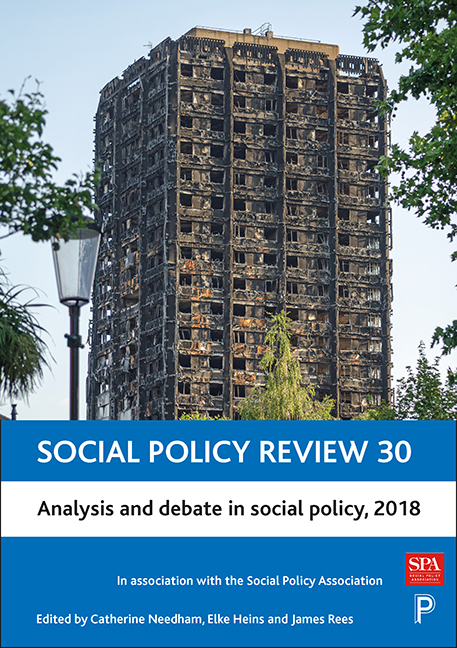Part One - Developments in social policy
Published online by Cambridge University Press: 22 April 2022
Summary
In the UK we have lived for over a decade with austerity-driven policies that shrink the welfare state, stigmatise people who receive state benefits and deepen child poverty. The private affluence/public squalor distinction made by J.K. Galbraith in the 1950s seems particularly apposite for our times. The fire that destroyed Grenfell Tower in West London, in which 71 people are confirmed to have died, was a horrifying visible display of the myriad failings of social housing policy. Critique of the modes of governance that contributed to the fire has been a key element of social policy scholarship, along with the articulation of modes of resistance. As the immediate horror of Grenfell fades in the public mind, those strategies of resistance – and the commitment to vigilance that go alongside – remain vital if anything is to change.
This 30th edition of Social Policy Review opens with Stuart Hodkinson's eviscerating account of the Grenfell fire, and the multiple threads that combined to produce the tragedy. Using the language of ‘social murder’, Hodkinson traces the roots of the fire to three interconnected policy drivers. The first is the planned destruction of the postwar public housing model under policies of privatisation, demunicipalisation and commercialisation. The second is the interaction between business deregulation and austerity. The third is the gentrification of urban neighbourhoods and the way that this has reshaped the housing market, particularly in London. He concludes that the structural drivers and policy failures behind the Grenfell Tower disaster were rooted in decades of neoliberal policy dominance in Britain. He frames it as a disaster ‘foretold’, not just by the Grenfell residents but also the long lineage of neoliberal critics, and hopes that it will represent ‘the moment in history when policy changed course’. This requires overhauling building and fire safety regulations, regulating the construction industry and ensuring that standards are enforced for all existing and new homes of all tenures.
Gary Craig's chapter on modern slavery has a related focus on the people who are the casualties of hyper-charged capitalism and who continue to be let down by lack of regulation or enforcement. His focus is the Modern Slavery Act 2015, and the chapter outlines the developments leading to this legislation, summarises it and evaluates subsequent progress.
- Type
- Chapter
- Information
- Social Policy Review 30Analysis and Debate in Social Policy, 2018, pp. 1 - 4Publisher: Bristol University PressPrint publication year: 2018

